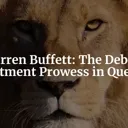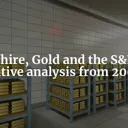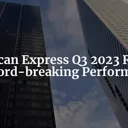Tags: Comments / History
This fanpage is not officially affiliated with Berkshire Hathaway: Disclaimer
Jim Bianco recently outlined implications of a "Liz Truss moment" for the United States on the famous Macrovoices podcast 1. But what was the moment and what would it imply for Berkshire Hathaway in particular? Let's dive into some speculations!

Introduction
In September 2022, the United Kingdom witnessed a dramatic episode that would come to be known as the "Liz Truss moment". During her brief tenure as Prime Minister, Liz Truss introduced a series of fiscal policies that sent shockwaves through the financial markets, ultimately leading to her resignation after just 49 days in office. This period serves as a stark reminder of the power financial markets wield over government policies and the potential for rapid economic upheaval.
The purpose of this article is to explore the implications of a similar moment occurring in the United States and its potential impact on Berkshire Hathaway. By examining the end of the 40-year bond bull market, concerns about US government debt, and the broader economic landscape, we aim to provide Berkshire Hathaway shareholders with valuable insights into how such a scenario could unfold and affect their investments.
Historically, the bond market has been a reliable source of returns for investors. However, as Erik and Jim discuss, the end of this bull market could have significant consequences 1. With the US government borrowing 25% of what it spends and running a 6% budget deficit, there are growing concerns about the debt becoming unserviceable and leading to a fiscal crisis 1. This scenario is particularly relevant to Berkshire Hathaway, given its extensive United States holdings across various sectors.
Understanding these potential scenarios is crucial for Berkshire Hathaway shareholders. The company's performance is closely tied to the broader economic environment, and a US fiscal crisis could have far-reaching implications. This article will delve into these issues, providing a comprehensive analysis and offering speculative insights into what a "Liz Truss moment" might mean for the United States and Berkshire Hathaway.
In the sections to follow, we will first explain the "Liz Truss moment" in detail, then explore US fiscal challenges and potential triggers, discuss the implications for Berkshire Hathaway, and provide historical, political, and economic insights. Finally, we will offer speculative scenarios and predictions to help shareholders navigate these uncertain times.
The Liz Truss Moment Explained
Liz Truss's premiership was marked by a series of bold but ultimately disastrous economic decisions. After defeating Rishi Sunak in the Conservative Party leadership election, Truss became Prime Minister on 6 September 2022 2. Her government quickly announced the Energy Price Guarantee to reduce energy prices, but it was the mini-budget unveiled by Chancellor Kwasi Kwarteng on 23 September that triggered financial instability 2.
The mini-budget included significant borrowing and tax cuts, aimed at stimulating economic growth. However, the financial markets reacted sharply, leading to a surge in bond yields and a loss of confidence in the UK's fiscal management 2. This reaction forced the UK Parliament to reconsider its deficit spending plans, illustrating the power of the bond / gilts market to influence government policy 1. Jim referred to this situation as the "Liz Truss moment," where the UK Parliament had to reduce its significant deficit spending in response to bond market reactions. Essentially, the bond market served as a regulatory force against overly extreme economic policies. Thank you, Mr. Market!
The political fallout was swift. Truss dismissed Kwarteng on 14 October and appointed Jeremy Hunt as his successor 2. This move, however, did little to stabilize the situation. Home Secretary Suella Braverman resigned on 19 October, and on the same day, MPs rejected a motion to ban fracking in the UK 2. Facing mounting pressure and plummeting approval ratings, Truss announced her resignation on 20 October, and Rishi Sunak succeeded her on 25 October 2.
In the aftermath, Truss blamed the Bank of England and other institutions for the failure of her growth plans 3. She criticized the Bank of England governor Andrew Bailey and other establishment figures, arguing that their actions contributed to the mini-budget disaster 3. This blame game highlighted the complex interplay between government policies and financial market reactions.
Historical parallels can be drawn to other events where financial markets have influenced government decisions ↗. For instance, the UK's withdrawal from the Exchange Rate Mechanism (ERM) on Black Wednesday in 1992 and the bailout of the Royal Bank of Scotland during the credit crunch are notable examples 3. These events underscore the potential for financial markets to act as a check on government policies.
Speculating on how a similar market reaction could unfold in the US, given current fiscal policies and debt levels, raises important questions. With the US government borrowing heavily and running significant deficits, a "Liz Truss moment" could force a dramatic rethinking of fiscal policy. Higher interest rates could put pressure on the economy, potentially leading to a crisis unless significant changes are made 1.
In the next sections, we will delve deeper into the US fiscal challenges and potential triggers, explore the implications for Berkshire Hathaway, and provide historical, political, and economic insights to help shareholders navigate these uncertain times.
US Fiscal Challenges and Potential Triggers
Current State of US Debt. The United States is facing a mounting debt crisis that has far-reaching implications for both the domestic and global economy. As of recent reports, the interest on federal debt is growing at an alarming rate, with the Treasury borrowing at a staggering $3 trillion annualized rate 4. This situation is exacerbated by the fact that an additional $8 trillion worth of debt is set to be rolled over in 2024, with the interest rates on new debt significantly higher than those on the old 4. By 2025, America is projected to spend a record amount of its national income just to service this debt 4.
Impact of Higher Interest Rates. Higher interest rates pose a significant threat to the US fiscal landscape. As interest rates rise, the cost of servicing the debt increases, adding over $100 billion to the Treasury's annual interest expense4. With Treasury yields touching fresh highs and the Federal Reserve signaling that high interest rates could persist due to inflation, the cost of borrowing is only set to increase5. This creates a vicious cycle where higher interest rates lead to higher debt servicing costs, which in turn necessitate more borrowing.
The International Monetary Fund (IMF) has issued stark warnings about the global implications of high US government debt. According to the IMF, increased government spending and elevated interest rates in the US are driving up global borrowing costs and undermining financial stability 5. The spike in yields on US government bonds is mirrored in other economies, leading to high and volatile yields globally 5. This situation is particularly problematic for low-income countries, which are more vulnerable to financial instability.
The political landscape in the US does not bode well for fiscal restraint. Neither President Biden nor Republican challenger Donald Trump has prioritized reducing deficit spending 6. This bipartisan neglect of fiscal discipline means that fiscal deficits are expected to continue, especially ahead of the presidential election6. Investors are increasingly concerned about the flood of US government debt issuance, which could overshadow any bond rally and lead to higher Treasury yields 6.
Investor sentiment is increasingly wary of the US fiscal situation. Some investors are reallocating funds to avoid losses from potential surges in Treasury yields 6. For instance, benchmark 10-year Treasury yields could reach 8%-10% in the next few years 6. Analysts from JPMorgan predict a future crisis, although they do not see it as imminent 6. Investors are advised to avoid long-dated US Treasuries and instead opt for short-term debt as a safer option 6.
Although some of these predictions seem quite pessimistic, a United States "Liz Truss moment" does not appear completely unrealistic per-se. A potential "Liz Truss moment" in the US could be triggered by a sudden loss of confidence in US fiscal policy or a spike in interest rates 1. The end of the 40-year bond bull market raises concerns about the US government debt becoming unserviceable, leading to a fiscal crisis 1. The outlined historical examples from the United Kingdom provide a cautionary tale of how quickly market sentiment can turn 3. These events underscore the importance of maintaining market confidence and fiscal discipline. Without significant changes, the US could face a crisis similar to the Liz Truss moment, where the bond market forces a rethink of deficit spending 1.
By the way, there is no law preventing this rethink without a Liz Truss moment!
Possible Implications for Berkshire Hathaway
Let us now dive into the possible implications for Berkshire Hathaway. To make life easier, let us focus on the subsidiaries 7, which make up the largest part of Berkshire's assets apart from a huge cash pile and the famous stock portfolio. Let's go sector by sector, of course without claim of completeness:
- Insurance Operations. Berkshire Hathaway's insurance subsidiaries, including GEICO and General Re ↗, could be significantly impacted by higher interest rates and financial instability. Higher interest rates would increase the cost of borrowing, which could lead to higher premiums for policyholders. Because of Berkshire's immense float, interest income would generally benefit. However, financial instability could result in higher claims, putting pressure on the profitability of these insurance operations.
- Energy Sector. This sector is another area where Berkshire Hathaway could feel the impact of a US fiscal crisis. Berkshire Hathaway Energy ↗, which includes major subsidiaries like Northern Powergrid, could face increased borrowing costs for infrastructure projects. Higher interest rates could also affect the cost of capital, making it more expensive to invest in renewable energy and other long-term projects. At this point Berkshire's huge cash position could be a significant advantage for BHE because of the possibility to finance projects internally.
- Railroad Operations. BNSF Railway, one of Berkshire Hathaway's key assets, could be affected by changes in freight demand and operational costs as it was partly the case for 2023 ↗. Higher interest rates could lead to reduced consumer spending and lower demand for freight services. Additionally, increased borrowing costs could impact the company's ability to invest in infrastructure and expand its operations.
- Consumer Goods. Economic instability could also affect Berkshire Hathaway's consumer goods businesses, such as Dairy Queen ↗ and See's Candies ↗. Higher interest rates and reduced consumer spending could lead to lower sales and profitability. Additionally, increased borrowing costs could impact the ability of these businesses to expand and invest in new products.
- Retail and Real Estate. Berkshire Hathaway's retail and real estate holdings, including Nebraska Furniture Mart ↗ and Clayton Homes ↗, could also be impacted. Higher interest rates could lead to reduced consumer spending on big-ticket items like furniture and manufactured homes. Additionally, increased borrowing costs could impact the ability of these businesses to expand and invest in new properties. However, the impact from the consumer side might be much more signifcant.
- Investments. Berkshire Hathaway's significant investments in companies like Apple, Bank of America, and Coca-Cola could also be affected by the US fiscal crisis. Higher interest rates and economic instability could impact the profitability and stock prices of these companies. Additionally, increased borrowing costs could affect their ability to invest in new projects and expand their operations as well.
Hence, higher interest rates might be mitigated by leveraging Berkshire Hathaway's substantial cash reserves, which would generate additional income through float. However, a decline in consumer spending is anticipated to have a significantly negative impact, affecting not only Berkshire Hathaway but the US economy as a whole. Berkshire Hathaway's diverse portfolio and strong balance sheet provide a buffer against potential economic instability. The company's wide range of businesses and significant cash reserves position it well to weather a potential US fiscal crisis. However, shareholders should remain vigilant and monitor the evolving economic landscape closely.
To mitigate risks, Berkshire Hathaway might consider reallocating investments or focusing on short-term debt 6. By avoiding longer-duration Treasury bonds and prioritizing short-term, more liquid assets, the company can maintain flexibility and reduce exposure to interest rate volatility. This strategic approach can help Berkshire navigate potential fiscal crises more effectively.
What about the United States in general?
Speculating on a potential US "Liz Truss moment," one can envision a scenario where a sudden spike in bond yields or a significant loss of investor confidence forces the US government to rethink its fiscal policies 1. Such a scenario could be triggered by a combination of high inflation, unsustainable budget deficits, and mounting public debt, leading to a financial crisis reminiscent of the UK's experience under Liz Truss.
In the event of a US "Liz Truss moment," we can expect increased volatility in Treasury yields and shifts in investor behavior 6. Investors might demand higher returns to hold US Treasuries, leading to a surge in yields. This could result in a selloff of financial assets globally, further exacerbating market instability.
The broader US economy would likely feel the impact through higher borrowing costs for households and businesses 5. Elevated interest rates would make it more expensive to service loans, potentially leading to increased financial instability and a slowdown in economic growth.
In light of these insights, Berkshire Hathaway shareholders are encouraged to stay informed about the current fiscal environment and consider the potential risks and opportunities it presents 1.
Navigating the complexities of the current fiscal environment requires a deep understanding of historical precedents, economic theories, and potential market reactions ↗. Let's us dive into some of these aspects before we conclude.
Historical, Political, and Economic Insights
The "Liz Truss moment" serves as a poignant reminder of how financial markets can swiftly and decisively influence government policy. Jim Bianco's reference to the need for leaders like Hamilton and Jefferson to bring fiscal sanity underscores the historical importance of prudent economic management 1. Alexander Hamilton, as the first Secretary of the Treasury, laid the foundation for the American financial system, emphasizing the importance of a strong central government and a robust financial infrastructure. Thomas Jefferson, while often at odds with Hamilton, also recognized the importance of fiscal responsibility, albeit with a focus on limited government. The current US fiscal challenges echo the need for such visionary leadership to navigate complex economic landscapes.
History is full of situations similar to "Lis Truss moments", at least in some aspects:
- The parallels to Denis Healey's misjudgment in 1976 are striking 3. Healey, the then UK Chancellor, left an IMF meeting in Manila, leading to a catastrophic financial miscalculation. This historical event underscores the importance of timely and informed decision-making in economic policy. For Berkshire Hathaway, this serves as a reminder of the potential consequences of misjudging market signals and the importance of staying informed and agile.
- Gordon Brown's bailout of the Royal Bank of Scotland during the credit crunch is another critical historical reference 3. This intervention highlights the role of government in stabilizing financial systems during crises. Similarly, the Bank of England's actions during Covid-19, including slashing interest rates to 0.1% and providing substantial support to the banking sector, illustrate the lengths to which central banks will go to maintain economic stability 3. These actions provide a framework for understanding potential US responses to future fiscal challenges.
James Carville's famous phrase, "It's the economy, stupid," encapsulates the centrality of economic factors in political decision-making 3. This principle is particularly relevant in the context of the Arthur Laffer tax theory, which advocates for lower taxation to drive economic growth—a theory embraced by Liz Truss and Kwasi Kwarteng 3. That does not mean the theory is wrong. But we are reminded of how different academic theory and the reality are. Modern monetary theory comes to mind, which has been popular during the last couple of years and used by many politians as argument for continued money printing 8. As an advocate of capitalism and democracy, it is puzzling why an idea with clearly socialist tendencies could have gained such popularity in the United States.
The IMF's concerns about global financial stability further highlight the interconnectedness of economies 5. High US government debt, increased public spending, and elevated interest rates are driving up global borrowing costs and undermining financial stability. For Berkshire Hathaway, this underscores the importance of monitoring global economic indicators and understanding their potential impact on the company's diverse portfolio.

Conclusion
The "Liz Truss moment" serves as a cautionary tale of the power financial markets wield over government policies and the potential for rapid economic upheaval. By examining the implications of a similar scenario unfolding in the United States and its impact on Berkshire Hathaway, shareholders can gain valuable insights into how to navigate uncertain times.
The US faces mounting debt challenges, with rising interest rates and unsustainable deficits posing significant risks to the economy. A potential US "Liz Truss moment" could force a reevaluation of fiscal policies, leading to market volatility and economic instability. Understanding historical, political, and economic insights can help Berkshire Hathaway and its shareholders anticipate potential triggers and prepare for various scenarios.
Berkshire Hathaway's diverse portfolio and strong financial position provide a buffer against potential fiscal crises ↗. However, strategic adjustments, such as reallocating investments and focusing on short-term debt, may be necessary to mitigate risks. Drawing lessons from history and staying informed are crucial for Berkshire Hathaway to make informed decisions and ensure the continued success.
In light of these insights, shareholders are encouraged to remain vigilant, proactive, and adaptable in the face of potential challenges. By understanding the speculative nature of the current fiscal environment and considering various scenarios, shareholders can position themselves for success in an ever-changing economic landscape. Berkshire Hathaway's strengths and resilience, coupled with a forward-looking perspective, offer reasons for cautious optimism amidst uncertainty.
References
-
Jim Bianco: Rate Hike on Deck - www.macrovoices.com ↩↩↩↩↩↩↩↩↩↩↩
-
Premiership of Liz Truss - Wikipedia - en.wikipedia.org ↩↩↩↩↩↩
-
Liz Truss wants to blame the establishment for sinking her plans - www.thisismoney.co.uk ↩↩↩↩↩↩↩↩↩
-
America’s Debt “Death Spiral” Gives Us $1 Trillion Reasons To Act Now - www.heritage.org ↩↩↩↩
-
America’s debt problem is storing up trouble for the rest of the world | CNN Business - edition.cnn.com ↩↩↩↩↩
-
Rising US debt burden spooks some bond investors ahead of election - www.reuters.com ↩↩↩↩↩↩↩↩↩
-
Berkshire Hathaway - Wikipedia - en.wikipedia.org ↩
-
Stephanie Kelton: Biden Has Adopted MMT - www.advisorperspectives.com ↩












